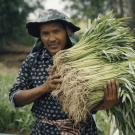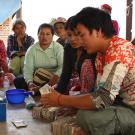The rapid economic growth and population expansion of Cambodian and Vietnam presents opportunities for impacting the livelihood of many people, where horticulture remains an important undeveloped business sector supported by small-scale farmers. This team's goal is to empower small-scale farmers (59% of whom are women) with integrated experiential education and training for sustainable vegetable production that limits postharvest losses, increases food safety, increases market access and, importantly, increases income.
The project team designed a participatory approach to meet these goals by networking experts in horticulture production through marketing. Including stakeholders of farmer communes, regional universities, local governments and national communications companies provides continuity needed for continuation of farmer outreach training and education beyond the lifetime of project funding. The successful completion of the project in Vietnam will serve as a model for implementation of the participatory action network in other, more challenging, countries like Cambodia and Laos with similar, but less developed, horticulture business sectors. Completion of this project will address essential capacity-building needs of Cambodia including an assessment of capabilities, research training, outreach development and promotion of communication between policy makers, universities and the agribusiness community.
One extension of this project will work with savings groups in Cambodia that will be trained in financial literacy and cell phone-related savings technology. The savings and lending groups will also be introduced to improved horticultural technologies investigated by other Horticulture Innovation Lab projects and provided with the opportunity to invest in these technologies. The project team will collect data on the demand and use of these technologies in rural farming systems. This model will enable information to flow in two directions, as farmers and savings groups gain access to “leapfrog technologies,” and the Horticulture Innovation Lab learns how rural farmers in Cambodia reinvent new technologies to accommodate local, on-the-ground realities. This project will also help determine which horticulture technologies are in demand among Cambodian farmers, and what specific conditions create demand for these technologies.


